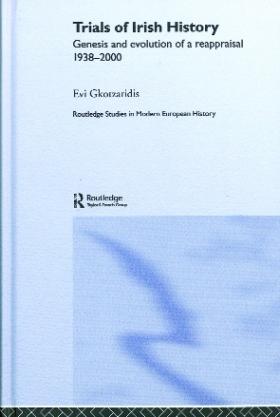Trials of Irish history: genesis and evolution of a reappraisal, 1938–2000
Published in 20th-century / Contemporary History, Book Reviews, Issue 6 (Nov/Dec 2006), Reviews, Volume 14 Trials of Irish history: genesis and evolution of a reappraisal, 1938–2000
Trials of Irish history: genesis and evolution of a reappraisal, 1938–2000
Evi Gkotzaridis
(Routledge, £75)
ISBN 0415329183
This is the oddest yet most engaging examination so far of the so-called ‘revisionist school’ of Irish historians, whose precepts, motives and performance have been subjected to an often rancorous but largely sterile debate over the past two decades. As a Greek post-modernist trained in France, post-doctored at Maynooth and currently based in Florence, the author is well endowed with cosmopolitan perspectives for revisiting Irish revisionism. In the course of research on the supposedly dry-as-dust school established by Theo Moody and Robin Dudley Edwards in the 1930s, and currently championed in less constipated style by Roy Foster, Gkotzaridis discovered an ‘astonishing twin-ship in sensibility, spirit and method’ between ‘Irish revisionism and post-modern theory’. In due course ‘the secret code began to unravel’, supplying the basis for a sustained polemic aiming to rescue the revisionists from their notorious distaste for theory and instinctive aversion to post-modernism. By accepting this hidden affinity, revisionists would be empowered to refute the ‘nasty and unfair’ attacks of ‘post-revisionists’, a school of cultural critics already well marinated in the terminology and spirit of Continental post-modernism (p. ix). At an advanced stage, Gkotzaridis experienced a ‘disconcerting intuition of the infinite manipulability of theory’, recovering her conviction in time to conclude that
‘. . . one thing is certain. The revisionist tendency to shy away from a more overt and systematic theoretical engagement has been a disservice. It prevented the profession from realising the degree to which their intuitions and insights have been vindicated and consecrated by post-modern theory’ (pp 270, 274).
In her frustration at revisionist ignorance of theory, if not in her particular (Lyotardesque) theoretical alignment, Gkotzaridis echoes other sympathetic non-Irish historian-critics such as Stephen Howe and Guy Beiner. Her idiosyncrasy is to offer an impassioned case for the defence rather than a detached interrogation of revisionist practice and counter-revisionist polemic. Were it not for the abundant evidence of wide reading and often acute interpretation, the singular design and playful style of this book might suggest a typically laboured post-modernist joke.
The case for reclassification rests on several interesting but conjectural comparisons between the attitudes and practice of the early revisionists and the French pioneers of post-modernism, who admittedly had no influence on their Irish soul mates. Indeed, ‘the loss of faith in historicism . . . was experienced prematurely in Ireland’, as a result of the fragmentation of Irish identity generated by ‘profound dissensions among the Irish people’ (p. 7). This realisation induced Moody’s school to adopt an unwittingly ‘discontinuiste’ approach, by challenging conventional narratives of national history and insisting upon the recent manufacture, changing dynamics and contested character of the ‘nation’. To my mind, it is untenable to reclassify revisionists from Moody to Foster as enlightened relativists, suffused by a post-modern sense of disintegration and disconnection with the past. On the contrary, their purpose in unpicking one national narrative was to replace it with some more complex but equally coherent account, capable of giving sense to ‘the course of Irish history’. Nor does the ‘captivating’ fact that revisionists, like post-modernists, are routinely accused of relativism, ‘denial’ and camouflaged fascism imply any structural affinity between the two tendencies (p. 227). And in spite of the author’s exuberant celebration of ‘the unfettered and audacious spirit’ of early revisionism, this left little imprint on the actual historical scholarship that resulted. For supposed revisionists such as myself (pp 208–9), wary and resentful of all manifestations of the post-modern condition, it is with relief that one fails to be convinced by Gkotzaridis’s elegant and richly elaborated thesis.
The very design of this book illustrates the yawning gap between revisionism and post-modernism as practised by Gkotzaridis. How might an orthodox revisionist, donning Moody’s mantle, have tackled the task of analysing revisionism as a research topic? First, by testing and challenging the ‘myth’ of a developing but coherent Irish revisionist school in continuous operation from 1938 to 2000; second, by identifying motives and agencies other than intellectual conviction that induced some historians to become declared revisionists, some counter-revisionists, others waverers; third, by defining a clear body of scholarly texts through which to dissect and contrast the practice of historians in each category; fourth, by assessing the impact of revisionist precepts on the public; fifth, by raising suitable international comparisons without assuming that the development of national histories throughout Europe spawned structurally identical revisionist reactions; and sixth, by adopting a detached style and presenting the evidence for and against each hypothesis without apparent bias.
It is remarkable that Gkotzaridis adopts none of these approaches. First, the coherence, continuity and academic dominance of ‘the revisionist school’ is assumed throughout, with no attempt to define its composition, its institutional dynamics, or the prevalence of rival ‘schools’ and of independent scholars. Yet most current practitioners would deny belonging to any unified school, while remembering with relief their escape (unless, as in so many cases, foreigners) from the stultifying rigidity associated with Moody and Edwards in their waning years. Second, the emergence of revisionism and the subsequent debates are treated as an interplay of disembodied ideas, taking no account of personal ambition or institutional influences (apart from the fractious dealings of early revisionists and the state, well analysed in a chapter on the Bureau of Military History). Third, instead of dissecting a sample of key historical texts, Gkotzaridis concentrates on the debate about revisionism, which all too often pits ‘cultural critics’ (non-historians) against non-practising historians prescribing research agendas for others. Close attention is also given to the private correspondence and political journalism of early revisionists such as Edwards and Desmond Williams, fascinating in itself but often at odds, in style and subject-matter, with their restrained and cautious scholarship. Fourth, Gkotzaridis offers no systematic assessment of revisionist success in reaching a popular audience through general histories, school textbooks, journalism, broadcasts, non-academic lectures, and even web sites. The missionary and populist urge has been powerful on both sides of the debate, and the outcome of that public struggle is surely more important than academic point-scoring. Fifth, it seems at odds with both revisionist and post-modern practice to declare at the outset that ‘there is little distinctively Irish about revisionism’, on the grounds that historians in most European countries experienced a similar revulsion against prevailing national narratives (p. 1). The character, functions and popular appeal of both revisionist and nationalist interpretations were not invariable but a product of the locus of particular ‘nations’ (within nation-states, federations, unions or empires) and the efficacy of the agents and institutions promulgating rival visions of the past. Finally, no revisionist could admit without blushing that her ‘original commitment . . . was to defend’ the virtue of any historical movement, even revisionism (p. x).
Though decidedly quirky in its approach and interpretations, this book is an exceptionally lively, generous, intelligent, wide-ranging and well-informed tribute to a much maligned but formidable lineage of historians. By making Irish revisionism interesting, it does what I had thought impossible. One awaits with interest the response of the post-revisionists whom Gkotzaridis has so deftly wrong-footed.
David Fitzpatrick is Professor of Modern History at Trinity College, Dublin.
















